Let the bells ring. War and Peace concludes in triumph. 5.7m viewers can’t be wrong. The critics agree: the man did it. He crammed Tolstoy’s massive quarts into half a dozen pint pots. Genius in a box set. Andrew Davies, reportedly, is signing up for Les Misérables. No warbling. No subtitles. If it has to be Victor Hugo I rather wish he’d gone for Toilers of the Sea, just to see how TV handled the giant squid (beats Moby-Dick any day of the week).
Davies’s breakthrough was Middlemarch, long ago in 1994. It was a book which Victorians like Trollope thought far too difficult for the common reader (among whom the Chronicler of Barsetshire counted himself – he, too, has been given the Davies kiss of life). Amazingly, Middlemarch shot to the top of the 1994 paperback bestseller list. The common reader, it turned out, loved Eliot’s Study of Provincial Life.
I would guess that a sizeable bulk of those 1994 purchasers “knew” the book but hadn’t quite got round to reading it. Life was short, the book was long. But, having watched the TV adaptation, time was found. I would guess every well-read person has a guilty literary bucket list. Often it’s the highest hanging fruit. The very difficult ones. Or, as with Middlemarch, the awkwardly long ones (Clarissa? I’ll just read those chapter summaries Richardson so usefully provided).
TV is the perfect lubricant and abbreviator. You could even argue it enriches; giving a visual dimension (and in Davies’s case an erotic dimension) to those small black marks on a white surface. Of course the TV adaptation “gives the plot away” – but most of the high-hanging stuff isn’t the-butler-did-it kind of thing, and no spoiler alert is needed. We know Napoleon isn’t going to win.
The higher up the tree you go, the sweeter grows the berry, says the folk song. What fruit is hanging up there, in the top branches, awaiting the adaptor’s subtle hand?
Finnegans Wake by James Joyce
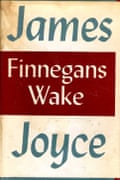
Finnegans Wake is a contender for topmost spot. Of course it’s difficult. So what; spend a lifetime on it, Joyce blandly instructed. One has a momentary vision of Hibernian madrassas, or yeshivas, neophytes “shokeling” (I think the term is) over passages (words?) like:
“bababadalgharaghtakamminarronnkonnbronntonnerronntuonnthunntrovarrhounawnskawntoohoohoordenenthurnuk!”
Everyone knows the first word (riverrun), the fact that it keeps Lynne Truss awake at night because of that missing apostrophe in the title … most know nothing else. Paradoxically this most difficult of novels would fit TV like a glove.
The richness of Irish literature (per capita they produce great novels like Serbs produce tennis champs) is plausibly traced back to the orality of their culture. Their mouthiness. Hearing Finnegans Wake would be a short-cut to making sense of it.
The novel’s plot is, intrinsically, as simple as Anne Enright’s indirect homage, The Gathering. A funeral for Finnegan is followed by a wake in which everyone gets royally pissed including (spoiler alert) the corpse.
But language spills out of Finnegans Wake like lava. The Wake calls out for audio-visual adaptation. Inside that verbal mass there’s a four-part miniseries struggling to get out.
Paradise Lost by John Milton
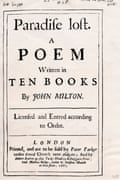
It’s the greatest story ever told. Everyone knows it, but I would bet even many English graduates have never honestly read Milton’s English epic, line by line, from the pre-Edenic battle in heaven to the post-Edenic couple, stumbling out into the bleak wilderness that is our world.
What makes Paradise Lost superior to Genesis (a story as full of holes as a colander) is that Milton makes wonderful sense of such holy writ nonsense as “knowledge” being forbidden fruit.
The poem hinges on that moment when Adam elects to eat the apple. Why? He’s got plenty of spare ribs left. But he loves this woman. At that moment, it’s world well lost. And after? With that mouthful he dooms himself, and all mankind, to life sentences of hard labour and death.
Paradise Lost has wonderful, Miltonic, dialogue – the seduction of Eve by the serpent rings in the ear as you read it and you can see the coiling tempter at his irresistibly slimy work. TV would solidify those impressions, and stimulate us to go back and read. We ought, as a literary nation, to be familiar with the greatest poem we have.
Forget Paradise Regained. It’s feebler than Godfather 3.
Gravity’s Rainbow by Thomas Pynchon
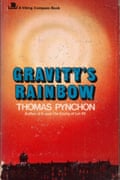
The academic George Levine – a man of unusually determined intellect – once wrote an article describing how he had taken three months off from university teaching to read Thomas Pynchon’s magnum opus. And nothing else.
A good TV adaptation, I believe, would save us Levine’s heroic self-punishment. Pynchon’s masterpiece opens in 1944 London. I was there. Pynchon (born 1937) wasn’t. But his reconstruction of the time and place is eerily accurate. It would make wonderfully visual TV.
The two great drivers of Pynchon’s narrative are paranoia and entropy. Gravity’s Rainbow is hyper-paranoiac. The paranoid person sees narratives everywhere – explaining the horrific randomness of our lives.
Nothing was more random than a V2 dropping on London in 1944. You’d be dead before the sound waves reached you. The hero, Tyrone Slothrop, a US Army officer works out that wherever he has an erection, a V2 drops. His penis is a missile guidance system. Or is he merely paranoid? It gets crazier. There has been one attempt to adapt it for TV. Aborted.
Atlas Shrugged by Ayn Rand
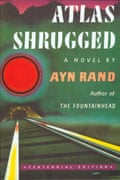
Rand’s is the most reviled yet influential novel of the post-war period. With its book-length supplement on ‘Objectivism’ (ie screw your neighbour as he will screw you) and its breeze-block bulk (1,100 pages) Atlas Shrugged was generally off-putting for the average 1957 consumer of novels. One reviewer, Robert Kirsch, said: ‘It would be hard to find such a display of grotesque eccentricity outside an asylum’.
But the book gradually took off. Now getting on for 20 million sales. John Galt, the hero’s “sign of the dollar” has become iconic (Rand chose to be buried under a huge bouquet shaped into the greenback symbol).
The book inspired Reagan and Bush (via the influence of Rand’s objectivist disciple, Alan Greenspan) and diffuses into Gordon Gecko’s “Greed is good”. You want to know what’s driving those Wall-Street scum in The Big Short who are making themselves billionaires by betting on homelessness for the masses? Read Atlas Shrugged.
The plot is simple. All the “wealth creators in America” (collectively the ‘Atlas’ who’s holding up the world on his shoulders) decide to bugger off and leave it to the “looters” and “socialisers” (ie the Democratic party and unionised labour). They too can ‘strike’.
It’s a novel with good visual scenes (the crucifixion of John Galt is particularly powerful) and it has, for my money, the best train crash ever described on paper. It shrieks for screen adaptation.
Between the Acts by Virginia Woolf
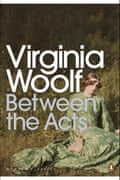
Most of us, nowadays – following the posthumous elevation of reputation – will have read the Woolf canon: Mrs Dalloway, To the Lighthouse, etc.
Between the Acts has slipped through the net, somehow. Although too few of us get round to it, it is Woolfian gold. The “acts” of the title are Tolstoyan: peace and war. They’re also Miltonic: life and death. It can also be read as the decay of Old England and the New England, struggling to be born. If, that is, it survives the jackboot.
Between the Acts can also be read as a suicide note in fictional form. It was published posthumously and unrevised (something that the perfectionist in her would have hated), a few months after Woolf drowned herself. The flat in which she wrote most of the novel had been destroyed by bombs in the Blitz.
In the early scenes of the novel the characters are constantly looking up at the skies (“is it a nightingale?”)
The action takes place over one day in high summer 1939. War broke out in early September. The Germans took France with ease. England soon, they fondly expected. The Woolfs were on the Gestapo death list.
The novel works in minor key. It opens:
It was a summer’s night and they were talking, in the big room with the windows open to the garden, about the cesspool. The county council had promised to bring water to the village, but they hadn’t.
It’s about much more than mains water. If you haven’t read Between the Acts read it, and if you can’t find time to read it, pray for a TV adaptation.
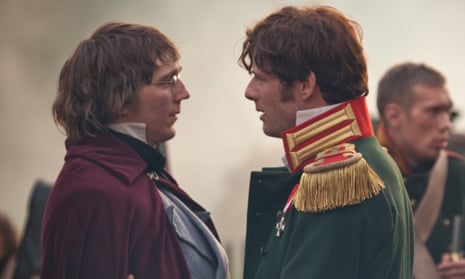
Comments (…)
Sign in or create your Guardian account to join the discussion